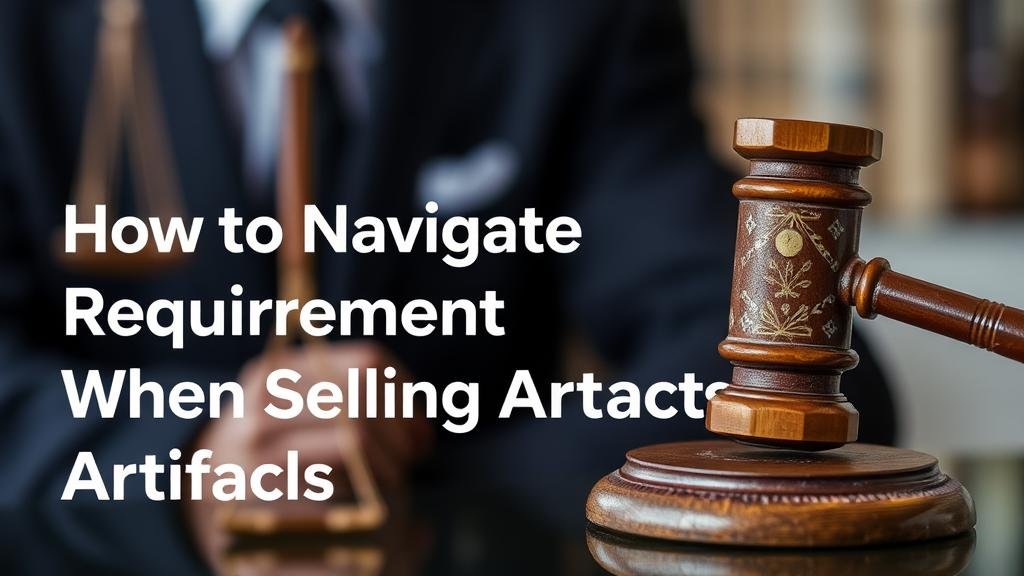How to Navigate Legal Requirements When Selling Artifacts
How to Navigate Legal Requirements When Selling Artifacts
Selling artifacts–whether they are historical items, antiques, or artwork–requires a comprehensive understanding of various legal considerations. Failure to adhere to these requirements can result in serious legal ramifications, including fines or the seizure of items. This article will provide an in-depth overview of the legal landscape surrounding artifact sales, breaking down the critical components into manageable sections.
Understanding Provenance and Ownership
Provenance, the history of ownership of an artifact, is a cornerstone of a lawful sale. Authenticating provenance can provide essential details regarding an objects origins and legal ownership, which is crucial in avoiding the sale of stolen or unlawfully acquired items.
- For example, the sale of a painting that had been looted during World War II would be illegal if the owner cannot prove clear ownership.
- Art dealers often require provenance documentation to protect themselves from future claims regarding stolen goods.
When acquiring artifacts, buyers should always request documentation that can include invoices, appraisals, or any official records that distinctly show the chain of ownership. The inclusion of this provenance in sales contracts is also a prudent step to add a layer of protection.
National and International Laws and Regulations
Different jurisdictions impose varying regulations regarding the sale and ownership of artifacts. Understanding these legal frameworks is vital for compliance.
- In the United States, the National Stolen Property Act prohibits the sale of stolen artifacts across state lines.
- Internationally, the UNESCO Convention of 1970 aims to prevent the illicit trade of cultural property, mandating that countries protect their cultural heritage.
As an example, an artifact from Egypt may be protected under the Egyptian Antiquities Law, which asserts the state’s right over its cultural heritage. Selling such items without proper permits or licenses can lead to significant legal issues, including potential criminal charges.
Import and Export Laws
When selling artifacts across borders, it is critical to understand import and export laws that govern such transactions. The process usually requires various permits and documentation.
- For example, in the U.S., the Convention on Cultural Property Useation Act requires import permits for artifacts classified as cultural property from designated countries.
- Failure to obtain these permits can lead to seized items or fines, illustrating the need for thorough compliance.
Also, consult with legal experts well-versed in international artifact law if you are selling items abroad, which will help navigate complex legal requirements and minimize risks.
Due Diligence and Ethical Considerations
Beyond strict legal compliance, ethical considerations play a vital role in the sale of artifacts. Conducting thorough due diligence is essential to ensure that sales are conducted morally and legally.
- For example, utilizing apps and databases such as the Art Loss Register can help verify whether an item has been reported as stolen.
- Engaging in dialogue and consulting with experts in the field can also bolster ethical practices within the art market.
Useing a due diligence process ensures that buyers are not inadvertently purchasing illicit items, preserving the integrity of the art market.
Establishing a Sales Contract
A comprehensive sales contract is a vital tool in legally selling artifacts. This document should outline all pertinent details regarding the item, including its provenance, the agreed price, and any representations or warranties regarding its authenticity and legality.
- For example, the International Chamber of Commerce provides guidelines that can be referred to when drafting contracts that adhere to international standards.
- Contracts should also detail dispute resolution processes and legal responsibilities, protecting both buyer and seller.
Incorporating these elements into sales contracts can help mitigate disputes and establish clear mutual expectations.
Documenting Everything
The importance of robust documentation cannot be overstated. Sellers should meticulously keep records of all transactions, including emails, receipts, and contracts. Documentation serves several purposes:
- It establishes a clear transaction history, essential for authenticity and future resale value.
- It protects against disputes by providing evidence of the agreement.
As a case study, successful galleries often keep detailed archives of their transactions, which helps in maintaining their reputations and assists in potential legal inquiries.
Conclusion and Actionable Takeaways
Navigating the legal requirements when selling artifacts is a multifaceted endeavor that requires diligence, ethical considerations, and compliance with various laws. Here are some actionable takeaways:
- Always verify provenance and maintain comprehensive documentation for each artifact.
- Understand and comply with local, national, and international laws regarding the sale of artifacts.
- Develop detailed sales contracts that clearly outline the terms of the sale and protect against legal disputes.
- Consult legal professionals to navigate complexities related to the artifact market and to enhance ethical business practices.
By adopting these practices, sellers can confidently navigate the legal landscape, ensuring successful transactions while promoting integrity in the art and artifacts market.


